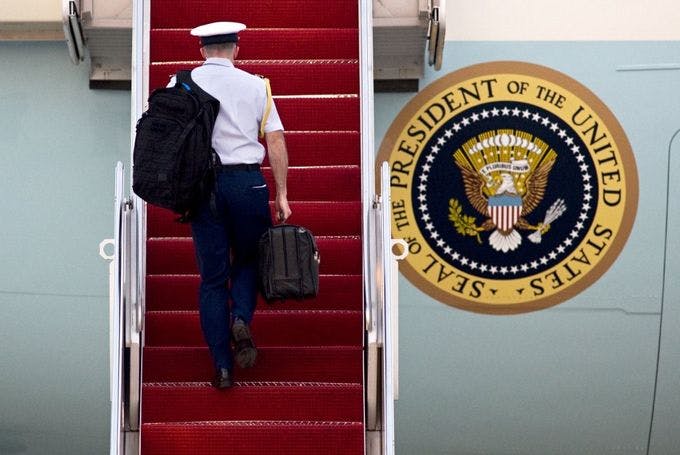The Nuclear Taboo
It is well that war is terrible else we should grow too fond of it
by Chris Thomas

If you haven’t read this tweet, you should:
President Trump is old enough to remember well the Cold War — when the United States and the Soviet Union growled at each other over a divided Berlin and stockpiled arsenals sufficient to exterminate each other and the human race a dozen times over.
He is old enough to recall civil defence drills, children ducking under desks, and the terror of those thirteen days in October of 1962 when the world watched in horror as war loomed over Cuba.
Nuclear weapons are the President’s most horrible and solemn responsibility. The “football” — the briefcase of nuclear attack plans which follows the President around — is like unto an American Crown Jewels: the symbol of the responsibility of office. Mr Trump has degraded that office and American national security with his cavalier tweets.
And that degradation is real. Those younger than Mr Trump can be excused for not knowing better, but the disposition of the world’s nuclear weapons does not brook the kind of indifference and lack of respect shown in the President’s words. Nuclear weapons and long-range missiles are expensive to produce and difficult to protect. Kim Jong Un almost certainly counts upon those missiles to defend him and his regime from the American military.
Should he come to believe that the United States plans to attack him, he should anticipate an American attack on his missiles. Should he anticipate an attack on his missiles, it makes sense to use at least some of them before they can be destroyed.
This is the risk Mr Trump is taking when he spars with Kim Jong Un on twitter. To American audiences the President’s missives might be seen as the bloviations of an insecure buffoon but to countries at odds with the United States his words carry outsized importance and must be considered as the cold, rational threats of a dangerous adversary.
When nuclear weapons are involved and tensions are high, those threats may be enough to loose missiles against the United States.
The realities of the nuclear age have forced previous Presidents to make a choice upon entering the White House: in the event of a nuclear attack, die commanding US strategic forces or survive to direct the war to follow. Like Obama, Bush, Clinton, Bush Sr, Reagan, Carter, Ford, and Nixon before him, President Trump was likewise offered this choice upon assuming office.
Mr Trump’s predecessors elected to die defending their country and the result of that determination has informed US nuclear policy for decades. Each previous commander in chief has understood that the case that follows his every move contains, in a sense, the instrument of his death. That understanding bred reverence for the horrible and solemn responsibility of the office. That reverence kept the world safe.
In light of his tweets, one wonders what decision Mr Trump has made in the event of nuclear war.
Tell Congress what you think!
If you feel strongly about Trump’s tweets resulting in the irradiation of an American city it’s better to have said something about it than not. Text RESIST to 50409 to tell your representatives or Senators what you think about this or any other issue before Congress or use Facebook messenger to do the same thing by clicking here.
Want to learn more about nuclear weapons policy?
Resistbot has you covered. Check out the story below from more on this from our archives.
Support the ’bot!
Upgrade to premium for AI-writing, daily front pages, a custom keyword, and tons of features for members only. Or buy one-time coins to upgrade your deliveries to fax or postal mail, or to promote campaigns you care about!
Upgrade to PremiumBuy Coins